Being part of HM Hospitales also allows the Center to optimize the timeline of the initial study, so it can give you a speedy diagnosis using “evidence-based medicine” and establish a treatment plan that is at all times aimed at minimizing obstacles to your dream of having a child.
But it's not just a case of carrying these procedures out. Thanks to the experience HM Hospitales has accumulated over more than 15 years, we understand the emotional rollercoaster you go through when you embark on these treatments.
That's why we've set up the FIVCARE program. This support system gives you round-the-clock access to a professional who knows you, who you can talk to and ask questions, and who will help you through the process while ensuring you have maximum peace of mind.
In-Vitro Fertilization is currently the most commonly used technique and the basis for all assisted reproduction treatments.
We have a pregnancy success rate of 90%.
Fertility Preservation
There are many women who for various reasons (including personal, financial and work-related reasons) decide to delay motherhood, resorting to fertility-preservation techniques.
These techniques consist in collecting a large number of eggs by stimulating a woman's ovaries during an operation under sedation (guided by ultrasound).
The collected eggs are then vitrified, so they can be used later. This way, you can
decide when you want to become a mother.
Egg survival rates of up to 97% are achieved with the vitrification technique.
Egg donation - Do you want to help other women become mothers? At HM Fertility Center, you can.
Egg donation is the method whereby donor women give their eggs to a recipient couple.
In this way, the necessary embryos are obtained to allow other women to achieve their long-awaited pregnancy.
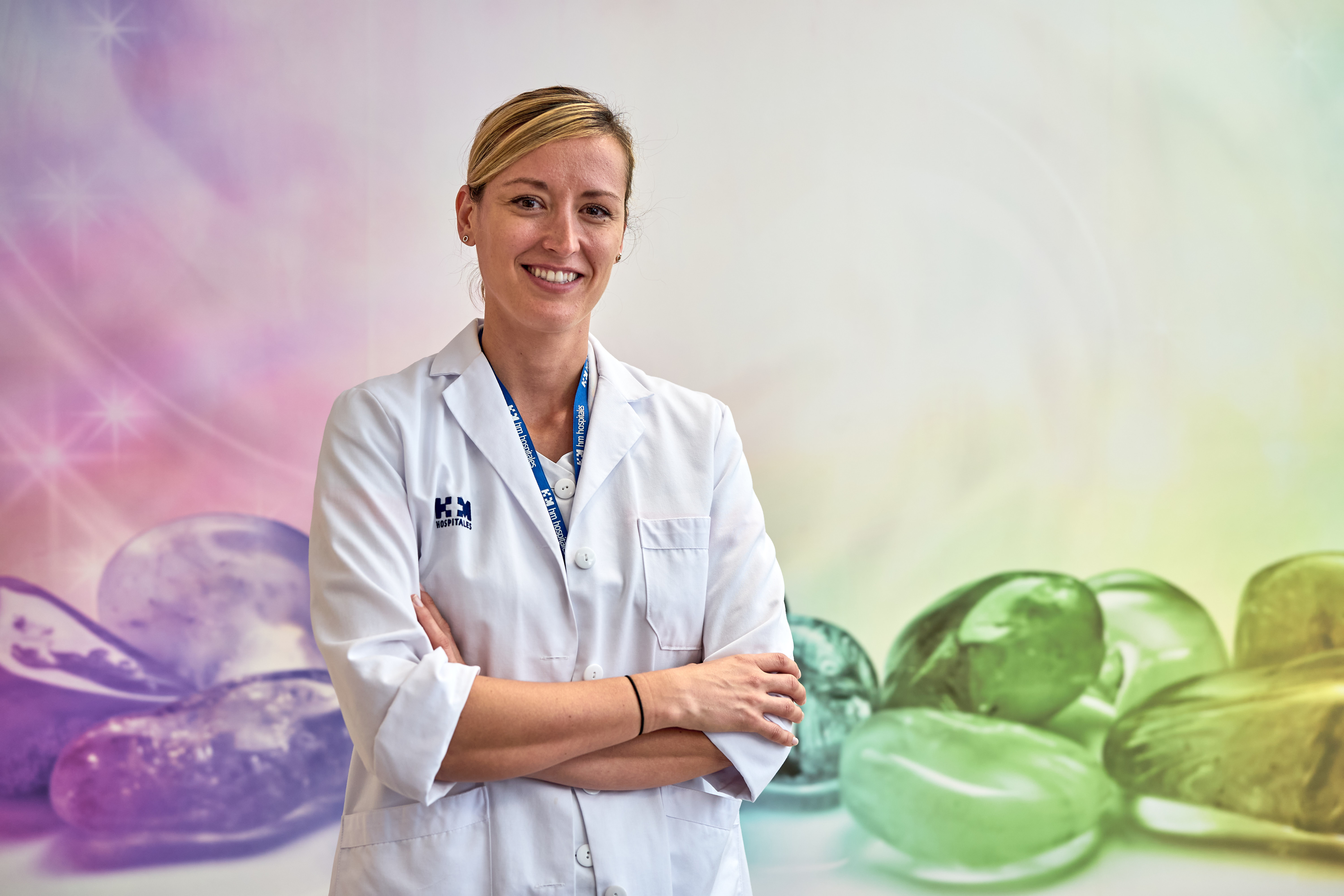
Preimplantation Genetic Diagnosis
HM Fertility Center offers you not only the best professionals, but also the most complete spectrum of treatments, such as Preimplantation Genetic Diagnosis (PGD). This technique consists of performing a genetic study on the embryos before they are transferred to the uterus, with the aim of preventing the fetus from suffering from avoidable genetic diseases. Since its inception, Preimplantation Diagnosis is a procedure that has made possible the birth of thousands of healthy children.
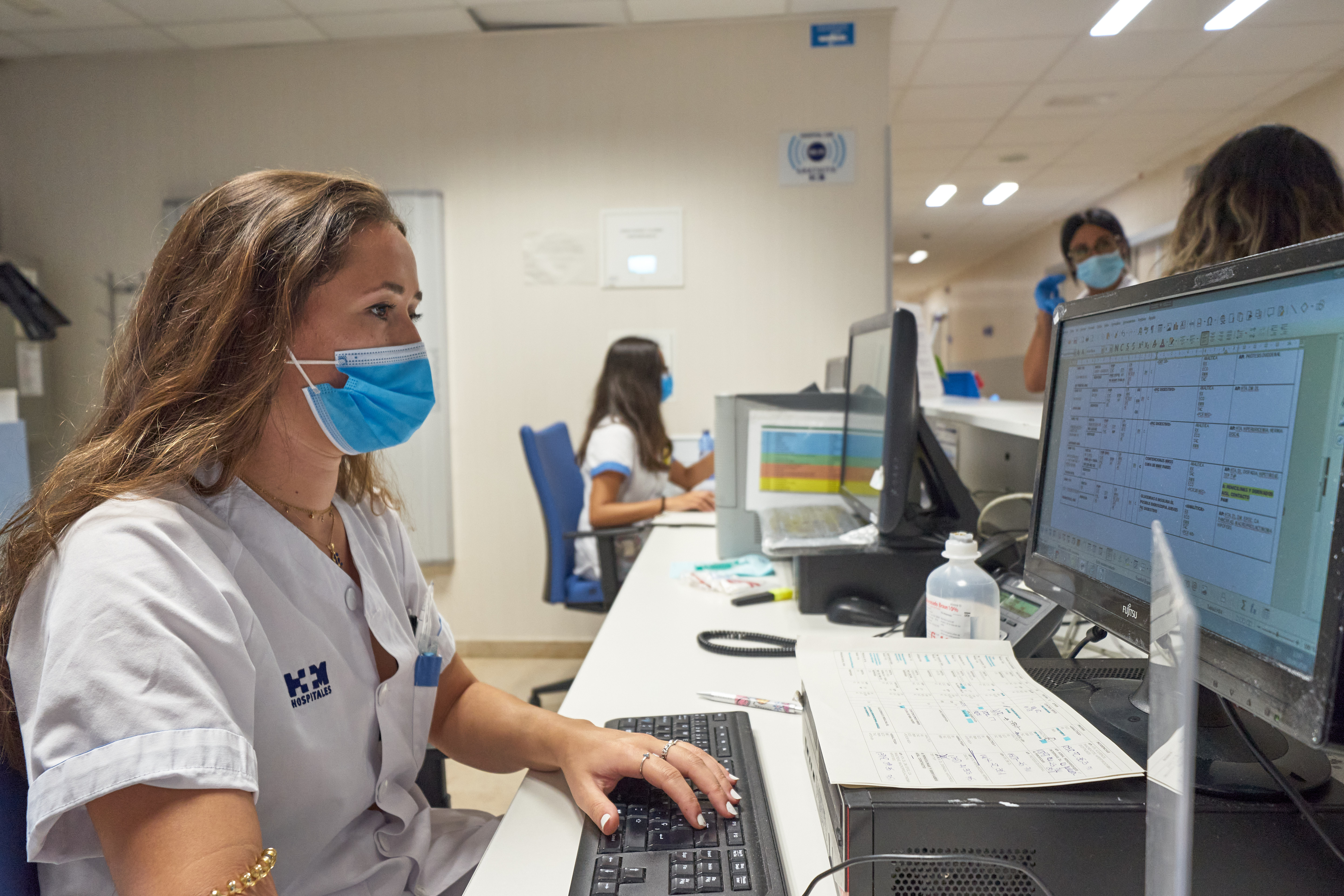
What is Preimplantation Genetic Diagnosis?
Preimplantation Genetic Diagnosis (PGD) consists of the genetic analysis of embryos in the early stages of their development in vitro.
It was developed with the final objective of being able to transfer those embryos diagnosed as healthy for the type of genetic study performed.
PGD is a procedure that, based on assisted reproduction techniques, informs about the status of each embryo before its transfer to your uterus, identifying possible genetic diseases that may affect the fetus once gestation is established.
This diagnosis allows only healthy embryos to be transferred to the uterus. Thanks to this process, future diseases (of which the parents are carriers) and even some types of cancer can be avoided.
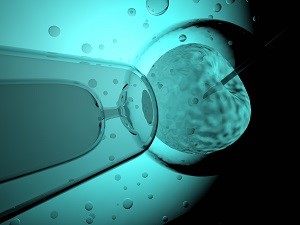
The Preimplantation Diagnosis technique is the result of the combination of an ICSI (Intra Cytoplasmic Sperm Injection) with a genetic analysis. Preimplantation genetic diagnosis makes it easier for your future baby to be born healthy.
Preimplantation Genetic Diagnosis is carried out on the third or fifth day of embryonic development, by means of a biopsy of either blastomeres or trophoblasts, which contain all the genetic information necessary to make the diagnosis.
Depending on the type of alteration to be studied, the biopsied cell is processed using the following techniques:
FISH (Fluorescent In Situ Hybridation)
5-9-12 chromosome analysis (Biopsy on day 3 of the embryonic development). It diagnosis numerical chromosome abnormalities (trisomies such as Down's syndrome) or structural abnormalities (reciprocal and Robertsonian translocations) and inversions.
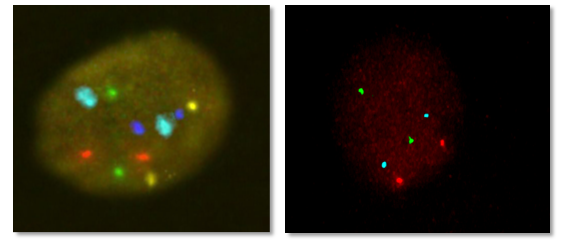
PCR (Polymerase Chain Reaction)
Monogenic diseases (Biopsy on day 3 of embryonic development). It is used in those cases where it is necessary to detect a gene mutation at the DNA level, for the diagnosis of a monogenic disease.
PREIMPLANTATION GENETIC DIAGNOSIS
Conventional methodology
· It is used in those cases where it is necessary to detect a gene mutation at the DNA level, for the diagnosis of a monogenic disease.
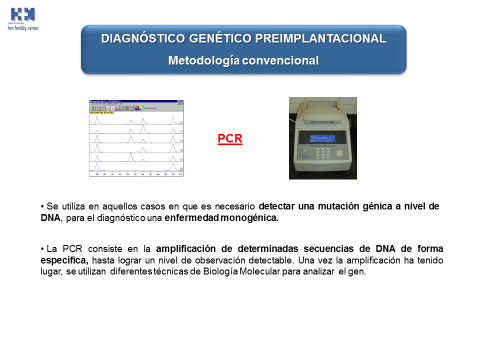
· PCR consists of the amplification of certain DNA sequences in a specific way, until a detectable level of observation is achieved. Once the amplification has taken place, different molecular biology techniques are used to analyze the gene.
CGH Arrays (aCGH)
Analysis of 24 chromosomes (usually the biopsy is performed on day 5 of the embryonic development). It detects alterations in all the chromosomes: 50% more abnormalities than the 12-chromosome FISH and 20% more abnormal embryos. With the new 24-chromosome aCGH techniques, together with the greater precision that biopsies the trophyectoderm on day +5, gestation rates of up to 75% per embryo transfer have been published.
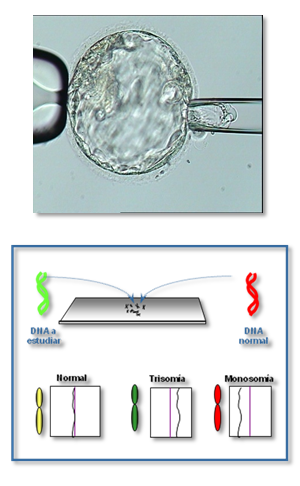
For whom is preimplantation genetic diagnosis indicated?
Preimplantation Genetic Diagnosis is indicated in the following cases:
- Couples in which the male suffers from alterations in the meiosis of the spermatozoa.
- Couples who are carriers of chromosomal or genetic diseases with the risk of transmitting these diseases to their descendants.
- Couples with a clinical history of recurrent miscarriages and chromosomal diseases found in previous miscarriages.
- Couples with a clinical history of implantation failure after several attempts at In Vitro Fertilization.
What are the advantages of preimplantation genetic diagnosis?
- One of the major advantages of Preimplantation Genetic Diagnosis is that it is carried out before the embryo is transferred to the uterus.
- With Preimplantation Genetic Diagnosis it is also possible to know the sex of each embryo, which prevents the transmission of certain congenital diseases linked to sex, such as hemophilia, cystic fibrosis, muscular dystrophy or Huntington's disease.
How is preimplantation diagnosis performed by FISH?
1. An ICSI is performed to obtain the embryos.
2. Embryo biopsy on day +3: this consists of extracting a cell from the embryo, which is processed for analysis and subjected to a genetic study. Once the PGD has been carried out, if there are viable embryos free of disease, the transfer will be made on day 5.
3. Embryo transfer. The result of the genetic analysis is transmitted by means of a detailed report to the HMFC medical team, which decides which embryos are to be transferred, according to their chromosomal endowment and the morphological characteristics of embryo viability.

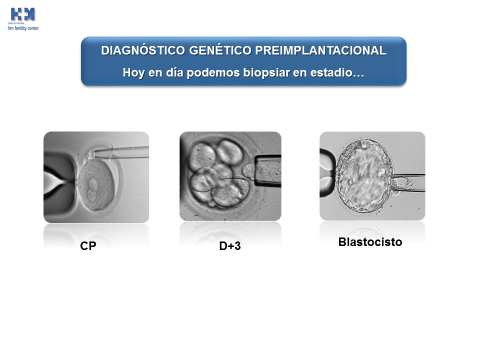
Pre-implantation genetic diagnosis
Today we can perform a biopsy in CP stage, D+3 stage and blastocyst
How is Preimplantation Genetic Diagnosis performed by trophoblast biopsy and aCGH?
1. An ICSI is performed to obtain the embryos.
2. Embryo biopsy on day +5: this consists of extracting cells from the outer layer of the embryo (embryonic trophoblast), which are processed for analysis and subjected to a more complete genetic study. Once the PGD has been performed, if there are viable embryos free of disease, the transfer will be made on day 6 or deferred until the next cycle, after embryonic vitrification at the blastocyst stage.
There’s a lot of life in you! Why not share it?

Fertility Center in-vitro fertilization
HM Fertility Center Medical Director:
Dr Isidoro Bruna Catalán
Fertility Center locations
Appointments or enquiries
Contact us
We will assist you at any hospital in Spain.
Hospital Universitario HM Montepríncipe Madrid
Av. de Montepríncipe, 25 28660 Boadilla del Monte Madrid
Opening hours: Monday to Friday from 08:00 to 20:00
Hospital Universitario HM Puerta del Sur
Av. Carlos V, 70 28938 Móstoles Madrid
Opening hours: Monday to Friday from 08:00 to 20:00
Hospital HM Vallés
Calle Santiago, 14 28801 Alcalá de Henares Madrid
Opening hours: Monday to Friday from 08:00 to 20:00
HM IMI Toledo
Avda. Irlanda, 21 45005 Toledo
Opening hours: Monday to Friday from 08:00 to 20:00
Maternidad HM Belén
Filantropía, 3 15011 Coruña
Opening hours: Monday to Friday from 08:00 to 20:00
Fertility Center locations
Appointments or enquiries
Contact us
We will assist you at any hospital in Spain.